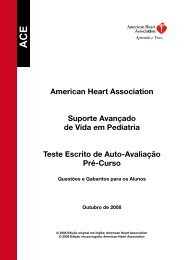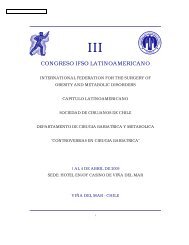Pediatric Clinics of North America - CIPERJ
Pediatric Clinics of North America - CIPERJ
Pediatric Clinics of North America - CIPERJ
Create successful ePaper yourself
Turn your PDF publications into a flip-book with our unique Google optimized e-Paper software.
CHILDHOOD ITP<br />
409<br />
corticosteroids (including pulse oral dexamethasone), IVIG, and IV anti-D<br />
(reviewed by Blanchette and Price [56]). Avoidance <strong>of</strong> medications known to<br />
affect platelet function adversely, especially aspirin, should be stressed and<br />
high-risk competitive or contact activities should be avoided during periods<br />
<strong>of</strong> severe thrombocytopenia. The goal should be to maintain a hemostatically<br />
‘‘safe’’ platelet count while avoiding the potential toxicities and cost<br />
<strong>of</strong> overtreatment, in particular the well-known adverse effects <strong>of</strong> protracted<br />
corticosteroid therapy. If treatment is recommended, the authors’ preference<br />
is to use short courses <strong>of</strong> relatively high-dose oral prednisone (4 mg/kg per<br />
day for 4 days, maximum daily dose 180 mg), IVIG (0.8 to 1.0 g/kg once),<br />
or, for children who are rhesus (D) positive, IV anti-D (75 mg/kg once), with<br />
all treatments given intermittently based on clinical need. Treatment is, in<br />
the main, outpatient based and parents and children (if <strong>of</strong> an appropriate<br />
age) should be informed about the risk, benefits, and alternatives to treatment,<br />
including the remote risk for transfusion-transmitted infections with<br />
virus-inactivated plasma-based therapies, such as IVIG and IV anti-D.<br />
The advantage <strong>of</strong> anti-D over IVIG in this clinical setting relates to the<br />
ease <strong>of</strong> administration (anti-D can be infused over 5–10 minutes compared<br />
with several hours for IVIG), significantly lower cost in some countries, and<br />
a comparable platelet-enhancing effect.<br />
Splenectomy<br />
Guidelines for splenectomy in children who have ITP are conservative,<br />
reflecting the significant spontaneous remissions that occur in children<br />
who have early chronic ITP and the small but finite risk <strong>of</strong> overwhelming<br />
postsplenectomy sepsis, a complication especially worrisome in children<br />
under 6 years <strong>of</strong> age. A group <strong>of</strong> United Kingdom pediatric hematologists<br />
recommended in 1992 that in children who have ITP, ‘‘splenectomy should<br />
not be considered before at least six months and preferably 12 months from<br />
the time <strong>of</strong> diagnosis, unless there are very major problems’’ [33]. New<br />
guidelines published in 2003 state that splenectomy rarely is indicated in<br />
children who have ITP but comment that ‘‘severe lifestyle restrictions, crippling<br />
menorrhagia and life-threatening hemorrhage may give good reason<br />
for the procedure’’ [36]. Practice guidelines developed for the <strong>America</strong>n<br />
Society <strong>of</strong> Hematology (ASH) advocate that elective splenectomy be considered<br />
in children who have persistence <strong>of</strong> ITP for at least 12 months and who<br />
manifest bleeding symptoms and a platelet count below 10 10 9 /L (children<br />
ages 3 to 12) or 10 to 30 10 9 /L (children ages 8 to 12 years) [5]. Only a few<br />
scenarios were considered, however. The efficacy and relative safety <strong>of</strong> splenectomy<br />
led Mantadakis and Buchanan [57] to recommend splenectomy for<br />
children older than 5 years who have had symptomatic ITP longer than<br />
6 months’ duration and whose quality <strong>of</strong> life is affected adversely by hemorrhagic<br />
manifestations, constant fear <strong>of</strong> bleeding, or complication <strong>of</strong> medical<br />
therapies. In contrast, the Israeli ITP Study Group recommends early





